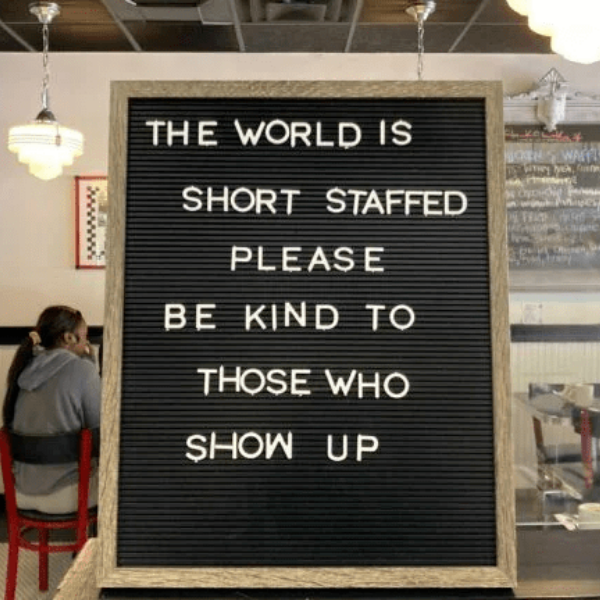“The world is short-staffed. Be kind to those that showed up.”
After we recover from COVID-19, a new, slower moving crisis looms. As a nation, we are facing a sansdemic – a shortage of workers that will likely affect businesses, colleges, and school districts nationwide.
We are shifting from an employer-based market (where there are multiple people to fill every role) to an employee-based market. With 10M open positions, the lowest labor market participation since the 1970s, and declining birth rates, business and education leaders alike should be preparing for this drastic change.
If potential employees have their pick of jobs, they are more likely to want to work for companies that encourage family-sustaining careers, foster professional development, and hire off of skills-based qualifications – instead of a bachelor’s degree.
If you look at the family-sustaining jobs out there in the country, what you find today are jobs that pay $60,000 or above on paper – 79% of them require a four-year degree. If you look at jobs that pay $40,000 of salary annually or above on paper – 71% of them require a four-year degree. If you focus on Black talent, ages 25 and above, 76% of us do not have a four-year degree. So what you’ve got is a barrier to the middle class. And, what we’re going to need to do is ensure that folks of all colors, folks of all economic means, folks who are in rural towns, as well as major metropolitan areas, have access to the education that equips them to perform the skills that allow them to garner, retain, and advance in jobs that pay family-sustaining wages.” Maurice Jones, President & CEO of OneTen
We believe that shifting to a skills-based hiring model is not only a more equitable approach but necessary for companies in this changing economy. As the labor market tightens, employers should consider casting their hiring net as broadly as possible. A recent blog by Emsi recommends scaling back degree requirements, technical skills, industry experience and years of experience because “every occupation has a baseline set of skills that are often shared broadly amongst industries” – at America Succeeds, we refer to these as Durable Skills.
Additional skills, especially those specific to an industry or technology, may be taught during onboarding or via job training once the applicant is hired. An added benefit is that job ladder opportunities can help with retention as competition to attract talent continues to increase.
Durable Skills Are The Foundation
COVID-19 accelerated existing trends in education and hiring for soft skills that were apparent long before the pandemic. Now, the need to ensure every scholar is equipped with the foundational durable skills to succeed in the workforce has become even more critical.
We have the opportunity to advance a larger group of learners in their career pathways by emphasizing common competency development in K-12 instead of varied technical needs. The Durable Skills initiative at America Succeeds seeks to ensure every student is prepared with the soft skills necessary for success in the workforce regardless of educational attainment, career path, or industry sector. Every student should be equipped with skills like communication, collaboration, critical thinking, leadership, resilience, and mindfulness.
When I think about Durable Skills, I think about their elasticity, the fact that they last beyond just a student in high school or in college. They actually transition all the way to the C-suite and the leadership boards. That is what is so powerful about these skills – that they have the ability to empower people and give them economic mobility throughout their career.” Ahva Sadeghi, Co-founder & CEO of Symba
Durable Skills, in combination with other accreditations – on-the-job training, credentials, two- and four-year degrees – set more people up for success which then helps in our economic recovery. By improving multiple pathways from education to the workforce, Durable Skills levels the playing field to obtain employment.
Join the Durable Skills Movement
Ultimately, America Succeeds’ initiative seeks to change culture by engaging employers in collective advocacy efforts around what makes an individual successful in the workforce and how K-12 education systems can meet that need. In reality, if we want young people to succeed in the jobs of today and tomorrow, we cannot wait and rely only on postsecondary institutions alone. Rather, K-12 education systems must be included as well.
Despite their differences, employers, parents, educators, state leaders, and policymakers are committed to ensuring students have a solid foundation for their future. Businesses from a variety of industries are aligned around the skills required in their respective fields. Together, we believe that we can build a more resilient workforce and promote student success in a rapidly evolving world.
Learn more about getting involved here.




